Ebola in Congo not yet a global health emergency, WHO says
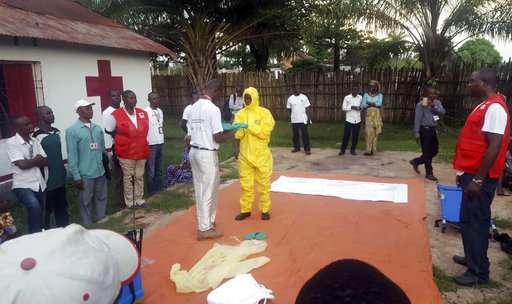
Congo's latest Ebola outbreak does not yet warrant being declared a global health emergency, the World Health Organization announced Friday, as health officials rushed to contain the often deadly virus that has spread to a city of more than 1 million.
The vast, impoverished country now has 14 confirmed Ebola cases, with dozens of others probable or suspected.
WHO officials, speaking after an experts' meeting on the outbreak, said vaccinations could begin as early as Sunday in a key test of an experimental vaccine.
The health agency called the risk to the public in Congo "very high" and the regional risk high, with the global risk low. The Republic of Congo and Central African Republic are nearby and are among nine neighboring countries alerted. WHO said there should be no international travel or trade restrictions.
Dr. Robert Steffen, who chaired the expert meeting, said there was "strong reason to believe this situation can be brought under control."
He noted the almost immediate response by WHO and partners after Ebola was announced in Congo last week. Without a vigorous response, "the situation is likely to deteriorate significantly," he added. If the outbreak spreads internationally, the expert committee would reconvene to reconsider its assessment of the epidemic.
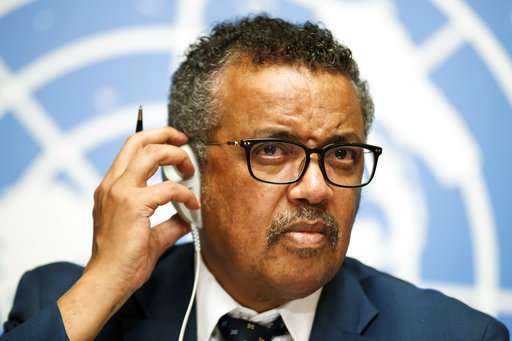
Congo has contained several past Ebola outbreaks but the spread of the hemorrhagic fever to an urban area poses a major challenge. The city of Mbandaka, which has one confirmed Ebola case, is an hour's flight from the capital, Kinshasa, and is located on the Congo River, a busy travel corridor.
For a health crisis to constitute a global health emergency it must meet three criteria stipulated by WHO: It must threaten other countries via the international spread of disease, it must be a "serious, unusual or unexpected" situation and it may require immediate international action for containment.
Ebola has twice made it to Congo's capital in the past and was rapidly stopped. Congo has had the most Ebola outbreaks of any country, and Dr. David Heymann, a former WHO director who has led numerous responses to Ebola, said authorities there have considerable expertise in halting the lethal virus.
The Ebola vaccine proved highly effective in the West Africa outbreak a few years ago, although the vaccine was used long after the epidemic had peaked. More than 4,000 doses have arrived in Congo this week, with more on the way, and vaccinations are expected to start next week. One challenge will be keeping the vaccine cold in a region with poor infrastructure and patchy electricity.
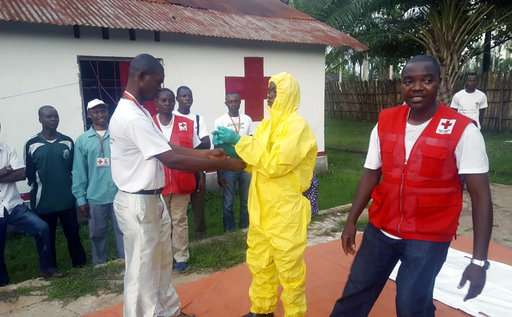
Just one Ebola death in the current outbreak has been confirmed so far. Congo's health ministry late Thursday said the total number of cases is 45, including 10 suspected and 21 probable ones.
The health ministry said two new deaths have been tied to the cases, including one in a suburb of Mbandaka. The other was in Bikoro, the rural area where the outbreak was announced last week. It is about 150 kilometers (93 miles) from Mbandaka.
"This is a major, major game-changer in the outbreak," Dr. Peter Salama, WHO's emergency response chief, warned on Thursday after the first urban case was announced. "Urban Ebola can result in an exponential increase in cases in a way that rural Ebola struggles to do."
Until now, the outbreak had been confined to remote rural areas, where Ebola, which is spread via contact with bodily fluids of those infected, travels more slowly.
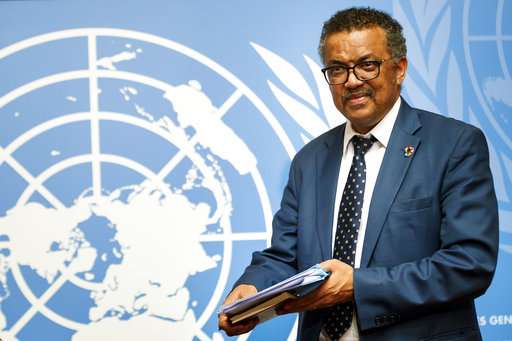
Doctors Without Borders said 514 people believed to have been in contact with infected people were being monitored. WHO said it was deploying about 30 more experts to Mbandaka.
Amid fears of the outbreak spreading to neighboring countries, the U.N. migration agency said Friday it would support the deployment of Congolese health teams to 16 entry points along the nearby border with the Republic of Congo for infection control and prevention.
The U.N. children's agency said it was mobilizing hundreds of community workers to raise awareness on protection against the disease.
This is the ninth Ebola outbreak in Congo since 1976, when the disease was first identified. The virus is initially transmitted to people from wild animals, including bats and monkeys.
There is no specific treatment for Ebola. Symptoms include fever, vomiting, diarrhea, muscle pain and at times internal and external bleeding. The virus can be fatal in up to 90 percent of cases, depending on the strain.
-
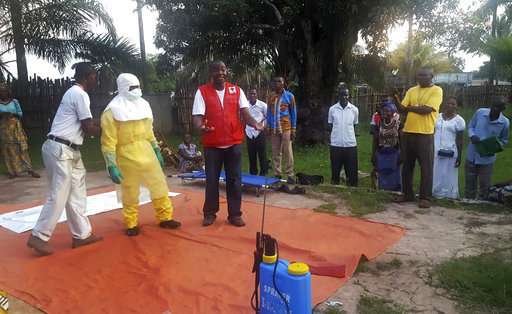
In this photo taken Monday, May 14, 2018, members of a Red Cross team don protective clothing before heading out to look for suspected victims of Ebola, in Mbandaka, Congo. Congo's Ebola outbreak has spread to Mbandaka, a crossroads city of more than 1 million people, in a troubling turn that marks one of the few times the vast, impoverished country has encountered the lethal virus in an urban area. (Karsten Voigt/International Federation of Red Cross and Red Crescent Societies via AP) -
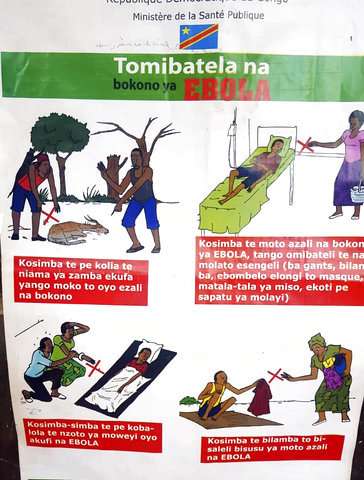
In this photo taken Thursday, May 17, 2018, a poster informing citizens how to deal with suspected cases of Ebola hangs on a wall in the capital Kinshasa, Congo. Congo's Ebola outbreak has spread to Mbandaka, a crossroads city of more than 1 million people, in a troubling turn that marks one of the few times the vast, impoverished country has encountered the lethal virus in an urban area. (Karsten Voigt/International Federation of Red Cross and Red Crescent Societies via AP) -
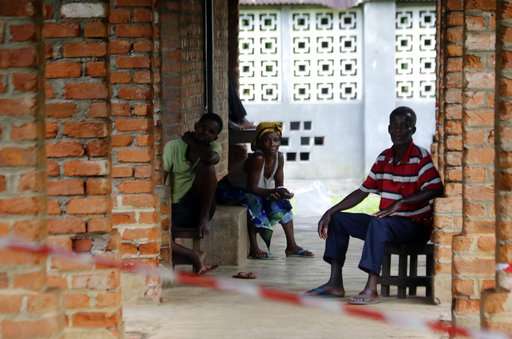
In this photo taken on Sunday, May 13, 2018, people suspected of having the Ebola Virus wait at a treatment center in Bikoro Democratic Republic of Congo. Congo's latest Ebola outbreak has spread to a city of more than 1 million people, a worrying shift as the deadly virus risks traveling more easily in densely populated areas. Two suspected cases of hemorrhagic fever were reported in the Wangata health zones that include Mbandaka, the capital of northwestern Equateur province. The city is about 150 kilometers (93 miles) from Bikoro, the rural area where the outbreak was announced last week, said Congo's Health Minister Oly Ilunga. (AP Photo/John Bompengo) -
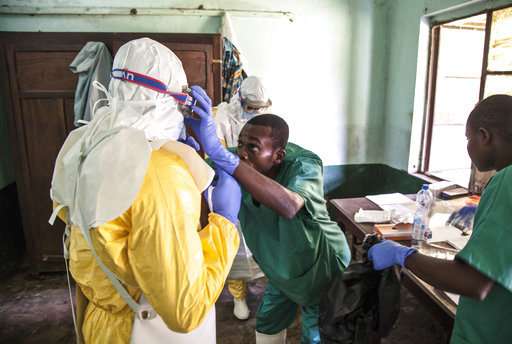
In this photo taken Saturday, May 12, 2018, health workers don protective clothing as they prepare to attend to patients in the isolation ward to diagnose and treat suspected Ebola patients, at Bikoro Hospital in Bikoro, the rural area where the Ebola outbreak was announced last week, in Congo. Congo's latest Ebola outbreak has now spread to Mbandaka, a city of more than 1 million people, a worrying shift as the deadly virus risks traveling more easily in densely populated areas. (Mark Naftalin/UNICEF via AP)
© 2018 The Associated Press. All rights reserved.


















